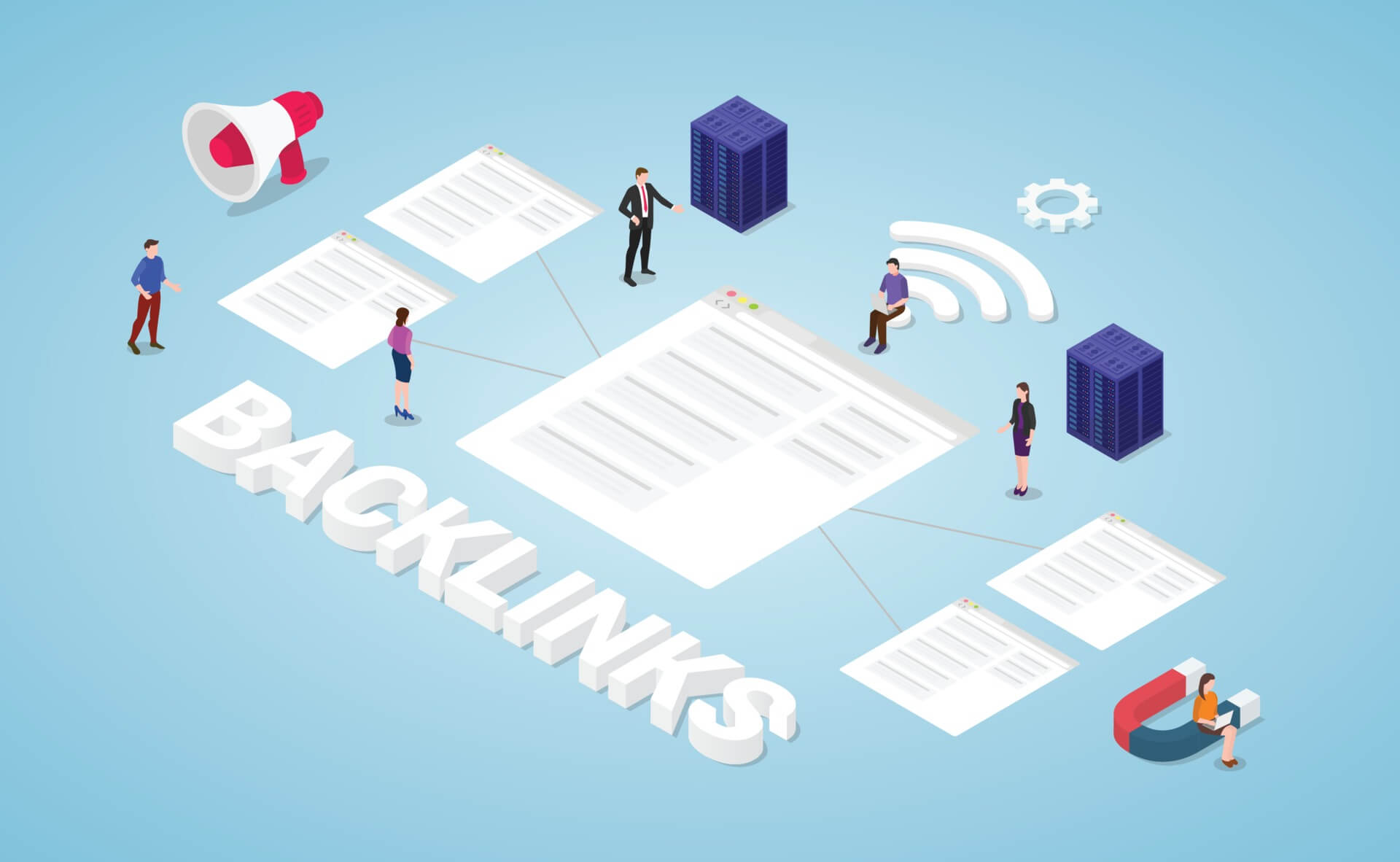Through all the changes to Google and other search engine algorithms, you’ll be forgiven for being wary of whether some of the behind the scenes SEO work for digital marketing just isn’t as effective as it used to be. Unfortunately, we know many spammy advertisers exist in digital marketing to sow distrust about whether your agency knows what they are doing in hopes to poach a client.
At AdVisible, we prize keeping our clients informed, interested and on top of the work we do.
That is why we thought it’s important to discuss backlinks – and why link building backlinks are still a phenomenal strategy for eCommerce, Lead Generation and Large Enterprises in 2022. For one, Google says it is still a part of how it ranks sites.
But first…
What are Backlinks?
- ‘Inbound links’
- ‘Incoming links’
- ‘External links’
- ‘One way links’
Despite the fancy name, all a backlink really is a link from one page to another.
In the case of a business owner like yourself, you want it to be from another relevant website that’s not a competitor, back to yours.
The importance of backlinks is that major search engines like Google use these links as a ‘vote of confidence,’ from other websites. As Google wants to do its job as a search engine to put forward high quality, credible websites (according to its EAT principle) that its users enjoy, this means with more ‘upvotes’ your website gains more visibility and is more likely to rank.
Google E-A-T and why it matters

You’re probably asking now, what is Google EAT? And how does it connect to backlinks?
EAT – ‘Expertise, Authoritativeness, and Trustworthiness’
To understand the power of backlinks in an SEO strategy, it’s important to understand this Google update.
EAT isn’t about food, but if you’re hungry we won’t blame you for grabbing a snack. EAT was a major update in Google geared towards uplifting websites with high-quality content from trusted sources, that they knew users will find valuable and be able to trust. Websites with high E-A-T are often journalistic news articles, Government organisations, or industry regulators.
Part of the way Google determines trustworthiness with EAT is through backlinks from relevant authoritative sites.
Backlink Benefits
So what are the benefits of backlinks?
Search Results
Backlinks are important for high rankings on searches. Google uses backlinks as a vote of confidence or endorsement from another website, which signals that your website would be worth showing to more search users with a bump forward in higher rankings.
Visibility
This backlink benefit is a KPI that takes several points of data into account to measure how well visible your website is online. This includes how high your website ranks for how many relevant keywords, and how often your website gets traffic.
Discoverability
Backlinks make your website more discoverable on Google, as it crawls and finds your website on others, especially from a trusted source. This discoverability means that it will be able to index your page faster.
Referral Traffic
Links from relevant external websites also provide the opportunity to get more potential buyers heading to your website to buy or generate a lead for a service.
Trust & Credibility
For new and small businesses especially, building up a profile of backlinks from trusted sources is an excellent way to build credibility for your brand, both from Google and from your target audience. Not to mention, it’s a great way to boost your SERPs, and get better results on Google Ads too!
What’s behind an effective Backlink?
It’s important to note that you don’t want to just reach out to any website for a link. Backlinks are not created equally, and besides the site and its authority, there are other factors that you need to consider to create a good, effective backlink.
Backlinks are judged in quality by these signals:
- Relevance: You almost always want a backlink to come from another website that is either on the same topic or closely linked to your website.
- Authority: A backlink from a high authority website, such as a news or government website will help raise your domain rating, and assist your site in ranking well. Google determines the authority of external websites through factors such as their age, quality, and size.
- Traffic: A link back from a page that gets a high amount of traffic is also brilliant for SEO. This opens the gate for relevant referral traffic, higher conversions and more traffic for continued better SERP rankings.
Low-quality backlinks can instead negatively impact a website, after the emergence of the Penguin 4.0 Google update, so it is important to get this right.
On top of these factors, there are some on-page and behind the page factors where these backlinks appear that improve these signals:
- Placement: Where a backlink appears on the page also can affect its effectiveness. If a link is prominently placed towards the top or main segment of the content, in bold text or colour, then it’s more likely to be clicked.
- Anchor Text: The text in front of a hyperlink is what we call the anchor text. The more relevant it is to your site, the stronger the signals sent to Google. This also helps create a better user experience for searchers. Anchor text for SEO backlinks should always contain a keyword you want to rank for.
- Dofollow links: All backlinks listed on an external site need to have rel=”dofollow”, instead of rel=”nofollow” because the latter tag tells the search engine to not follow or pass on any authority from the page to the link.
What are citations?
Citations operate a bit like backlinks, but instead of a direct link back to a website they are instead a mention of your business’s name, address and phone number. Citations particularly are great along with backlinks for local SEO, with businesses with lead generation models that really benefit from getting contacted.
Partial backlinks can also exist, such as when just the company’s name and address are listed.
How to Optimise for Link Building

We know how the saying goes – knowledge is one thing, implementation is another.
Here are some backlink tips on how to get some quality backlinks up there:
Guest Posts
One of the ways many businesses have been getting backlinks is by writing great guest posts on blogs or publishing websites and using the blog to link back to yourself. Guest blogging is a win-win tactic that benefits both the publishing website and the guest post’s business, as the first gets new content and the latter gets a link back to their website.
Niche Edits
Instead of writing a whole guest post, this strategy is focused on getting a backlink edited into an existing high performing blog post or page. Here you will need to find and reach out to the right sites, then ask or barter through email outreach to get your link added.
Skyscraper Content
This is a backlink strategy tactic created by Brian Dean of Backlinko. The idea is to find great quality content that has already earned a substantial amount of backlinks, then create content on the same topic but better, and then reach out to those who originally linked to the initial work.
It’s important to note that this level of content takes a lot more work, and goes all-in on the length, depth and visuals. If you can add information that no one else has such as your own case studies, or product testing.
Create Complete Guides
By creating all-out ‘ultimate guides’ to a niche topic or query, especially on a topic that can’t be found anywhere else, you can set up a page that garners a lot of links from bloggers and influencers talking about the topic.
Acquire Editorial Links
There’s a reason why many businesses are looking for ways to (positively) make the news, on top of the brand exposure on the article or video. Even if your business isn’t the main topic of a story, having a company representative provides a surefire way to get a citation. Getting included in a roundup topic from publishers online will also give you an editorial backlink.
Find Dead Links
Have you ever gone to a resource list or clicked on a link through a blog and been taken to a 404 page? This is a goldmine for creating new content that you can target to a certain publisher or linkreator. Write a blog targeting the topic it was linked to and cover the topic well. Afterwards, you can reach out to the site owner and recommend your new content to replace their broken link. This also improves the quality and user experience of their own article. It’s another win-win situation.
Take Aways
Building backlinks is still incredibly important for SEO today, as off-page links remain one of the prime signals Google uses to identify and rank quality sites. It is important that you don’t just create a strategy to attain links from anywhere and instead aim for high-quality links, as it can hurt your results. This is where a data-driven SEO agency can really come in and make a difference.
How AdVisible Has Delivered With Link Building
Our knowledgable SEO analysts have achieved great results for our clients in eCommerce, lead generation, and enterprises through building links within our SEO strategy and alongside our Google Ads, to drive excellent results:
- 700% increase in clicks on average per month – Popcar
- 206.58% increase in conversions – Growth Labs Australia
- 129% increase in conversions in organic and paid traffic in 2 months – Tenderfield
Want to start increasing your site’s credibility and visibility on the web?
Enquire Now, and let’s talk about whether a link building strategy may help align your digital presence with your goals.
Attribution:
Web Vectors by Vecteezy
Frequently Asked Questions:
Businesses seek backlinks from other websites (ideally websites with high DA and relevancy) because they contribute to the website’s credibility and authority in the eyes of search engines like Google.
Backlinks help to improve a website’s visibility in search results, driving more organic traffic and potential customers to the site. Additionally, backlinks from reputable sources can enhance a business’s reputation and online credibility.
While backlinks are generally beneficial for SEO, there can be downsides if the backlinks come from low-quality or spammy websites.
Bad backlinks may harm a website’s reputation and ranking, as search engines like Google may penalise sites for having unnatural or manipulative links. That’s why businesses must focus on gaining high-quality and relevant backlinks from reputable sources to avoid any negative consequences.
Yes, a website can have too many backlinks, particularly if those backlinks are low-quality or spammy. Search engines like Google prioritise the quality and relevance of backlinks over quantity.
So, websites with an excessive number of irrelevant or manipulative backlinks may be penalised by search engines, resulting in lower rankings or even removal from search results; quality should always be a priority over quantity when it comes to backlinking strategies.
No, backlinks are not the only factor that influences a website’s search engine ranking. While backlinks are important for SEO, search engines like Google consider numerous other factors when determining a website’s ranking.
Ranking factors include the quality and relevance of content, website architecture and user experience, on-page optimisation, mobile-friendliness, page speed, and more. So, the best way to approach SEO is a holistic strategy that addresses various aspects of website optimisation, which is key to achieving and maintaining high search engine rankings.






